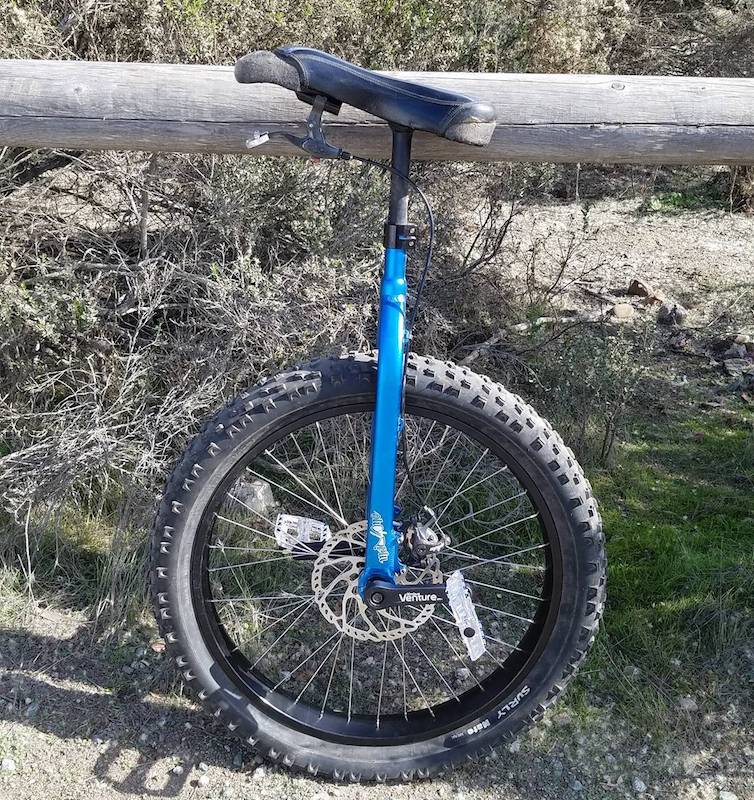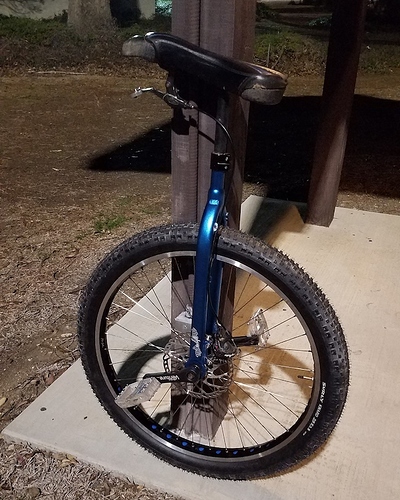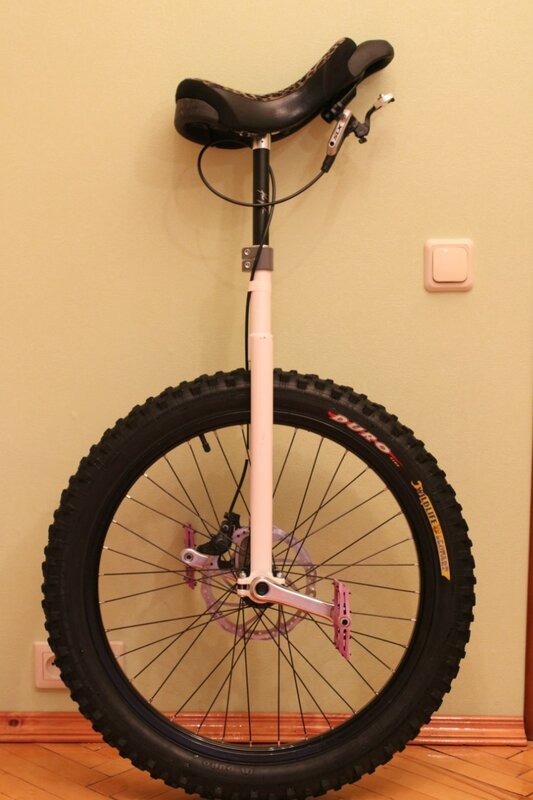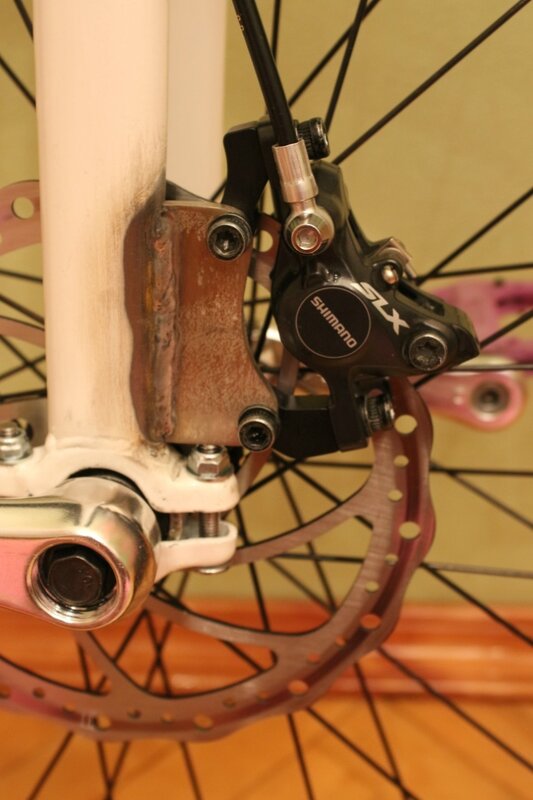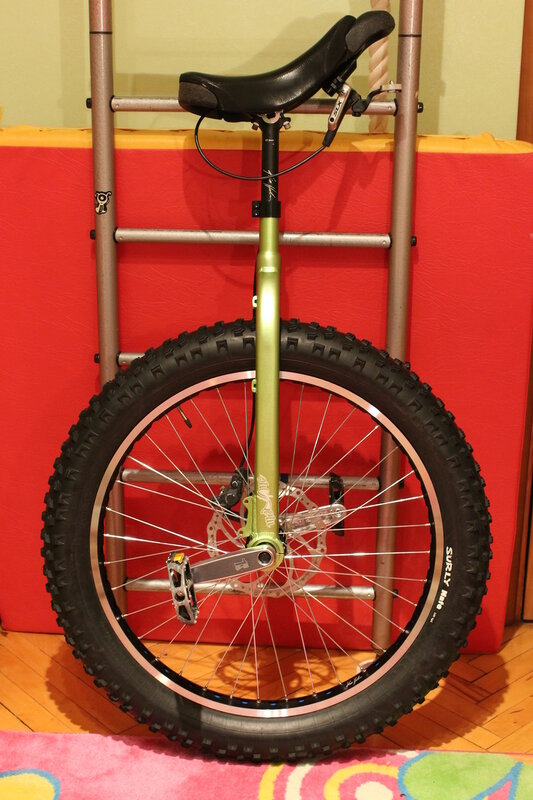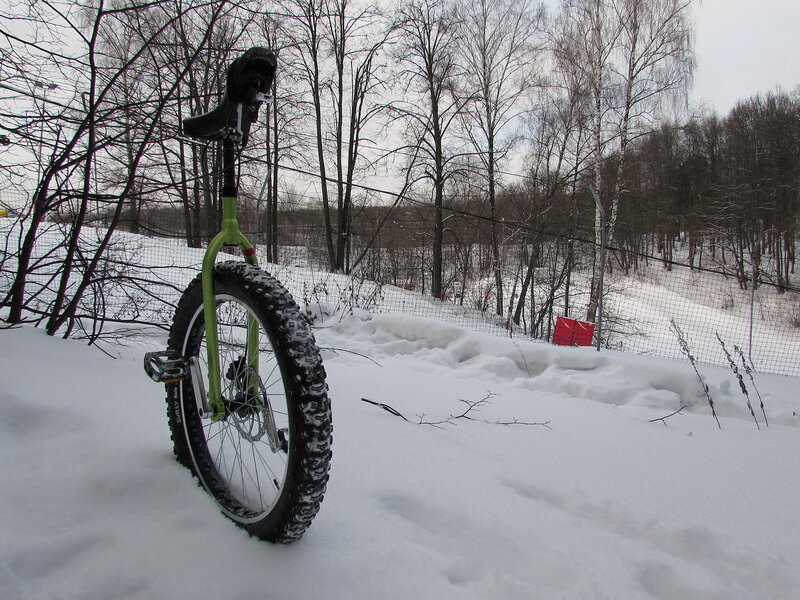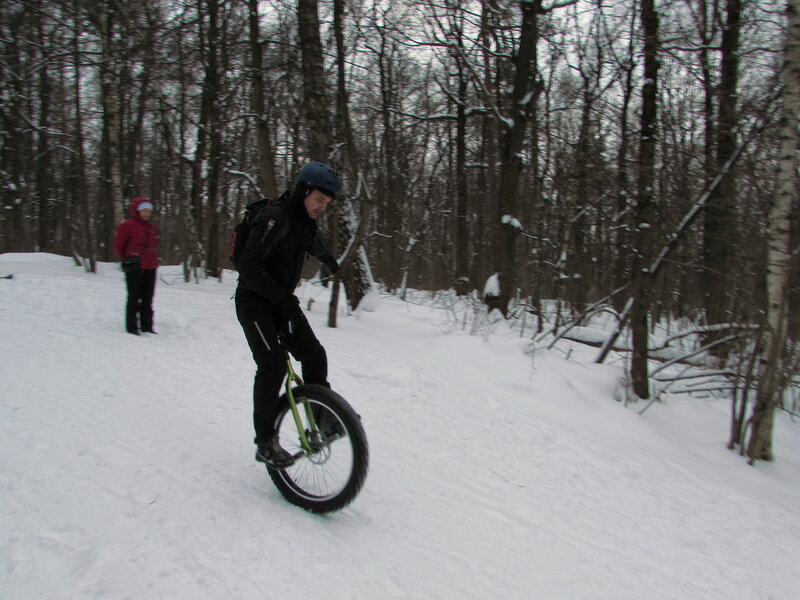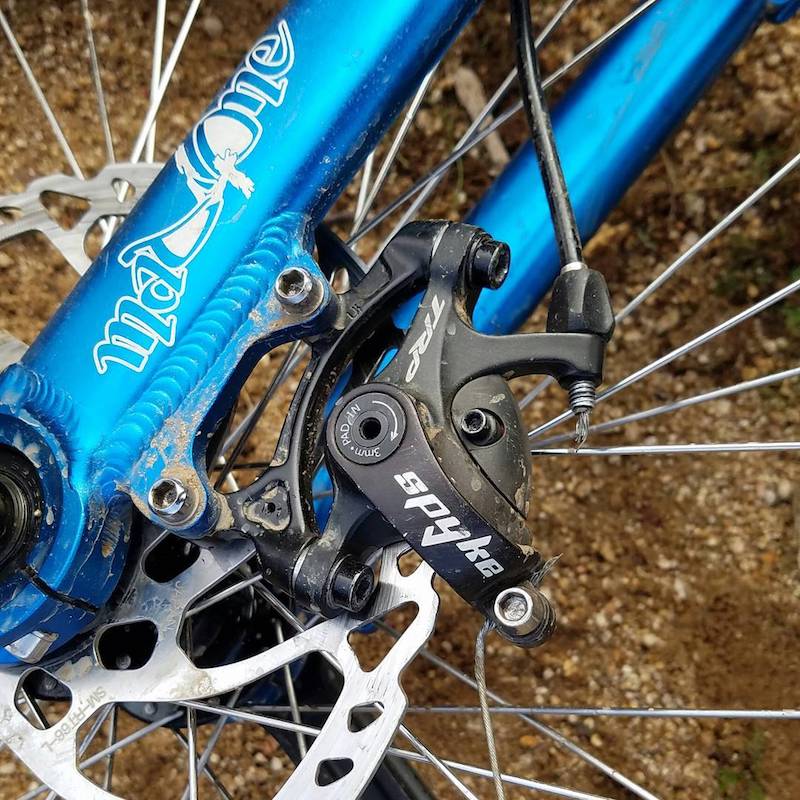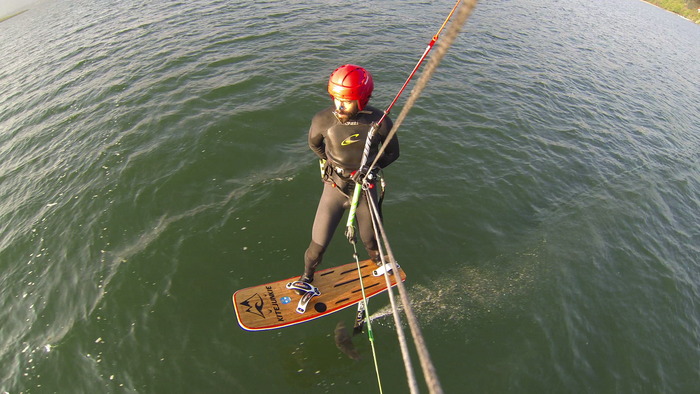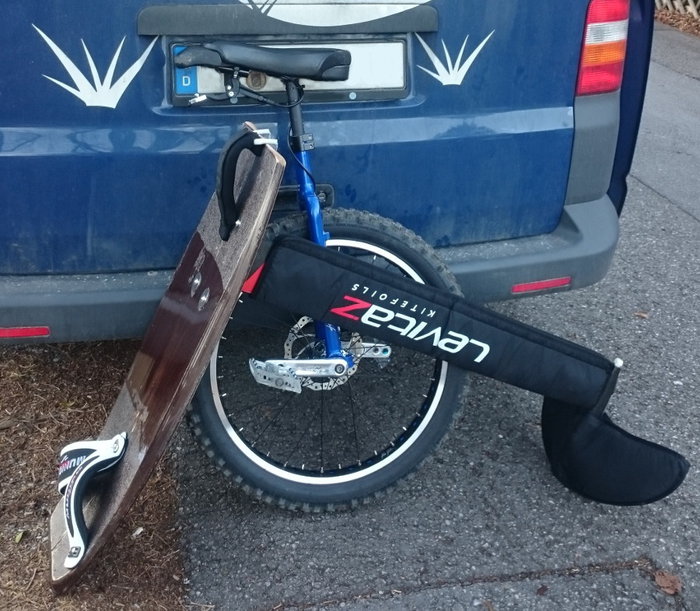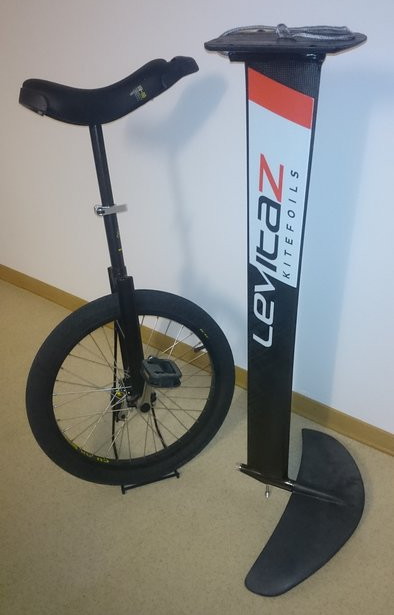Here’s a little video of it in action.
So, there was a freewheel uni lying at Unicon beside the bathroom in the school, whoever was the owner of this uni, I couldn’t find you. I left a note and took it for a ride haha. Man this thing was awesome! I personnaly dont think it’ll be a thing, it’s fun to ride, but I doubt it’ll ever get better than a ‘‘true’’ uni. This uni still convinced me I needed one in my collection.
I ordered my Freewheel disk hub from UDC yesterday 
That was the one I brought. It’s a drift trike front end from Trike Daddy Customs. I rode it at the school from time to time and tried to tell as many people as I could where I left it so they could try it when I wasn’t around. I meant to make a sign or something but I got busy with the basketball tournament. I’ve been back riding a freewheel a lot lately to prepare for riding at a ski resort tomorrow and the issues I see are:
-
The cotterless hub is a limiting factor, just as it was in the early days of mountain unicycling. I personally have a rolling style when riding even fixed but hopping on a freewheel would get you through some terrain just like it would on a fixed wheel. However, you’re risking bending the axle. There’s no market for an ISIS freewheel hub but I’d like to commission a custom one someday. An ISIS freewheel hub would be better for jumping, too.
-
Maximum torque is a limiting factor on climbs. I don’t know if freewheel bike hubs have this issue but I’ve found on the Nimbus Drift Trike hub too much torque can make the hub skip forward which may eventually break the pawls. I’ve had the pawls replaced on one hub and I usually walk through very steep sections (which I could ride if I wasn’t concerned about the hub). There are some other hubs I could try but it’s not that big a deal.
-
Over braking can cause a UPD. This can be improved with practice.
-
Hitting obstacles (bumps or rocks or whatever) at high speed when coasting or brake-coasting can cause a UPD. To me this is the most challenging part of freewheel unicycling. I feel I can roll slowly over many obstacles but as I increase speed there’s a chance I won’t be able to absorb the jolt and will get knocked off. Finding this point is tricky, especially on unfamiliar terrain. Pedaling through obstacles like you are forced to do on a fixed wheel is significantly easier.
Have fun with your freewheel!
With the help of midgetmiles I finally have my 26" fat freewheel unicycle. I don’t think the 65mm rim was actually necessary; I could have gotten fine by with a 50ish rim.
Beside your freewheel adventures: How would you rate the frame? Are you fine with the mad4one frame? Quality, stiffness?
Advantages of freewheeling instead of wheelwalk-gliding:
- You spare yourself the trouble of finding the pedals and returning to them after a glide.
- You can use a larger diameter wheel without having your knees in your face.
- Debris, moisture or dogshit on your tire will not affect you in a catastrophic way.
- You have more freedom to run your tire at low pressure- wheelwalking and related activities are generally more difficult on a squishy tire.
Did I miss anything? All of this points to a freewheel, rather than gliding, being best for off-road, no? Having just learned to wheel walk, and hoping to soon learn gliding, I am curious about this, even though I usually only ride on cement.
Yeah, I think, that’s it! What would be really great would be a hub that’s not permanently in freewheel mode but can be shifted between fixed and freewheel. Because the temporary aspect is the big advantage of gliding/ brake coasting over freewheeling.
I wheelwalk and coast but cannot glide. I generally don’t wheelwalk for distance and maybe a quarter mile is the most I go at one time and that’s not very often (more like 100 yards or less). I’ve gone maybe a 100 yards at most coasting at one time but I don’t really have a great place to do it now. I usually go half the length of a basketball court and run out of space (using the other half to get up to speed). By contrast I’ve freewheeled thousands of miles on and off road.
I can get back to the pedals after coasting, but I’m not 100%. It’s considerable easier staying on the pedals in the first place.
Especially true for those of us who are shorter.
I can wheelwalk off road on a larger, squishier tire but it’s certainly a novelty. I can’t coast on a larger tire at all and hardly at all off road. The freewheel gives you all the tire choices of a fixed wheel unicycle. However, extremely technical terrain is mostly prohibited and extremely steep terrain is not advised because of the limitations of the current hub technology.
I haven’t seen any off road downhill gliding videos but I think the degree of difficulty for very long downhill gliding runs is much higher than riding a freewheel unicycle, especially if you end up brake-coasting most of the time (vs. pure coasting).
One of the reasons I wanted a 26" fat freewheel unicycle was to ride in an out of the way off road trail that doesn’t get much traffic. I can practice coasting the same downhill spot over and over again and not worry about stopping to wait while people went by (or having to talk to them if they’re curious). The tire evens out the terrain which would be harder on a narrower or smaller tire. On flat, smooth terrain (paved or dirt) I try to transition between pedaling and coasting as much as possible (not using the brake at all). When no people or cars are around the only limit is conditioning and concentration.
I love the frame! It’s gorgeous with a great color selection. It’s light and has disc tabs on both sides. It does have some flex, however, which may be more a function of its extra width. My Triple Triton had flex, too. I can’t recall if my Flansberrium had a similar amount of flex but the clearance is greater so is not noticeable when a wheel is mounted. It’s not a big deal on this frame for me because I have to be careful not to over torque the hub anyway. The side knobs of my Surly Nate do rub a bit riding uphill and I could try to shave them or let them naturally wear down. But that’s on a 65mm rim. If you’re considering this frame for a fixed wheel build I would keep it to 50mm at max.
Thanks for your feedback on the frame.
With the help of midgetmiles (who built the wheel) I have a 29+ freewheel unicycle. I only rode it a short time in the parking lot but my first impressions are positive. I’m curious to see how the suspension compares to the fat 26".
You are nuts. And I mean that in a good way.
Ditto! I gotta give a lot of credit to you freewheeling guys (and gals). That takes either guts, insanity, or a good balance of the two!
It’s my first training freewheel unicycle. It’s Koxx White Russian 24" with self welded brake bracket. It was built nearly two years ago.
Now I rebuilt it in 26" fat freewheel unicycle. I LOVE four inches! 
It looks great! I’m finding that the suspension of the 29x3 is similar to 26x4 but there’s a little less traction. I’m sure that’s a huge help on snow! I know most people run hydraulic brakes but I run mechanical and had a brake cable break for the first time last weekend.
Rocky Canyon Trail 12-18-2016
A couple quick clips I shot last weekend before running into mechanical problems.
So smooth!
Today I went for a 8-9 mile freewheel 36" ride on the Snoqualmie Valley trail. It was my first “big” ride on any freewheel and a great test of my wheel build. My gear performed flawlessly, but I discovered quite a few interesting things:
-
It’s much easier to coast on pavement than gravel. The bumps and unpredictable hills on the trail caused speed changes that really messed up my balance.
-
The faster the unicycle is going, the easier it is to coast without a brake. This means that you take a pretty big gamble when selecting a speed to coast at. You have to choose between a safe runout speed with a higher chance of needing to run out, and a high runout speed but a lower chance of falling. Unfortunately, this doesn’t appear to be a proportional difference so I’ll need to practice quite a bit to make high speeds worth it.
-
Bigger wheels are easier to coast on than a smaller wheel, likely due to gyroscopic precession and the speed mentioned above
-
There appears to be a range where coasting isn’t particularly effective, and pedaling requires the rider to constantly accelerate. The range likely varies depending on the rider’s coasting style (all brake coasting, brake controlling speed, brake only being used to stop), entry speed, and ability to coast at lower speeds
-
freewheel unicycling is easier on the legs, but much harder on the back and core than a fixed wheel unicycle
-
trying to ride a fixed wheel uni right after riding a freewheel uni caused some trouble when I tried to engage the brake and stop pedaling.
I have very little experience with freewheel unicycling, so it’s very possible that I could be completely oblivious to the reasons behind some of the points. Im really analytical, so I could be overthinking this badly as well.
- freewheel unicycling is awesome
Thanks a lot to everybody for all the info.
As still beginner till reading nearly the hole topic, I thought freewheel is nearly impossible. But stupid me, as I am driving since a while something that is physically a kind of
freewheel for the water, I call monofoil, which hasn’t got a break for stability but is most time stabilized by the kite pulling it, but can also be driven with nearly no pull from the kite hands off the bar:
Here is the video: Horst Sergio Mono Foil kitevideo
What might be interesting for “terrain” freewheelers:
A kite can give you a very high stabilizing effect and may therefore helpfully for learning. A lesson I learned when trying munikiting the first time two weeks ago:
The stabilizing effect does not just come from controlling the pull of the kite but using a body harness and one hand on the bar means that you can also receive torsional moment as you got two fix points: the harness and the bar which is on a string that is stiffened by the kite pull.
Hope to try freewheel with kite once myself, but as beginner not now, still feel the KH Fusion One form my yesterday first 1/2 marathon ![]()
But maybe one of you knows to handle a kite and is interested to try: freewheel kiting, which could work great. ![]()
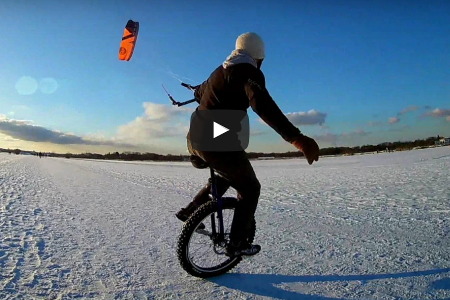
Freewheeling with Kite
Gosh I really like that idea !
